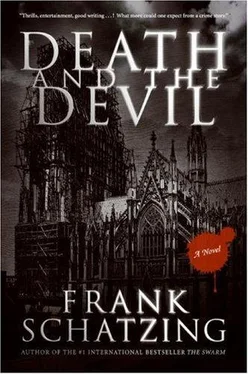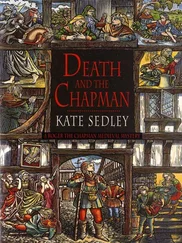After what seemed like an eternity he heard the carter shout, “Whoa.” As far as he could tell from his admittedly restricted viewpoint, there was nothing around that suggested human habitation. He saw the carter’s legs as he jumped down. They moved away, parted. There was a splash as a stream of urine hit the ground.
Jacob tried once more to free his fingers from the planks. He went about it systematically this time, one by one, instead of trying to pull them all out at once. He began with the little finger of his left hand, twisting and jiggling it, freeing it little by little until it was released. One out of ten! At least it was a start. If he could get one out there was hope he might eventually be able to resume an upright posture.
He just had to keep on twisting and jiggling.
The relieved carter came back, climbed up into his seat, and urged the horses on. He would have to make do with just the little finger for the moment.
Some time later Jacob saw walls along the side of the road. Once he briefly heard voices. Then, with a repeat of the nerve-jangling noises, the cart turned off to the right onto a flat area, where it halted. Clearly it was likely to be a longer stop this time, since the carter had disappeared into a building a few yards away.
Patiently Jacob set to work. Now that he no longer had to brace himself against the swaying and shuddering of the cart, it turned out that things weren’t as bad as he thought. The remaining fingers of his left hand did cling rather obstinately to the planks, but once they were free, the right hand slipped out by itself and Jacob fell off the shaft onto the dusty ground.
With a sigh of relief, he lay there, trying to recover. Then he examined his hands. His knuckles hurt and were bleeding, but he didn’t care. He had escaped and that was the only thing that mattered.
Only—escaped to where ?
Like a little mouse, silent and on all fours, he crept out from under the cart and surveyed the terrain. His first impression was of a spacious courtyard or, rather, a gently rising square ending a little way ahead in an ivy-covered wall with closely planted trees behind. On the right was a long row of low buildings, not dissimilar to a monastery dormitory, with a wide entrance leading into a still larger open space. Beyond it the squat tower of a small church could be seen, also surrounded by trees. From the closest building, where the carter had gone, Jacob could hear the faint sound of voices.
He walked around the cart and saw a wall with a gate, through which they had evidently come.
A gate that two men were just closing.
He quickly pulled the hood back over his head. He couldn’t make out what kind of building this was. It didn’t seem to be a monastery, nor a village or hamlet, and the walls were too low for a castle compound. The men wore cloaks and hoods, but they weren’t monks. His preferred option was to run away, but that was no longer possible. The two men could turn at any moment. Better to take the bull by the horns.
Assuming a dignified priestly posture, he went over to one of the cloaked figures and tapped him on the shoulder. “Excuse me,” he said.
The man turned around.
Jacob recoiled in horror. He was staring at a decaying skull without nose or lips. Where the left eye should have been was a hole gleaming with yellow pus. The other was regarding him expressionlessly.
Unable to repress his retching, he took another step back.
The being stretched out something toward him that had perhaps once been a hand and came closer. Unarticulated grunts came from its throat. Now the other man had joined them. A tangle of beard covered his face, which was unmarked, apart from a few weeping patches. With a suspicious look, he watched Jacob as he staggered back, unable to take his eyes off the horrifying figure. Then he burst out into harsh laughter.
Slowly they came toward him.
Jacob turned and ran toward the church, where a few men and women were standing, talking quietly among themselves. As he approached they looked up at him.
Ravaged faces. Missing limbs.
At that moment the door of the building where the carter had gone opened. A man whose legs ended at his knees crawled out to see what was going on. Laboriously he struggled in Jacob’s direction. The two from the gate were catching up with him while the group by the church prepared to encircle him. Desperately Jacob searched for an escape, but wherever he looked the place was bounded by walls. He was trapped. They had surrounded him, were ready to fall on him, tear him to pieces, transform him into one of them. Jacob’s head was ringing. He stumbled and fell to his knees.
One of the men opened a hole of a mouth with spittle dribbling out, and squatted down. “Can we help you?” he asked politely.
Help? Jacob blinked and looked around. Regarded dispassionately, one could hardly say they had surrounded him. On the contrary, they were observing him timidly and keeping their distance.
Again the bearded man from the gate laughed. “Hannes always gives them a fright the first time,” he roared. It didn’t sound at all threatening, just amused and friendly. The strange grunts were still coming from the faceless man’s chest, but now Jacob realized he was laughing, too, the laughter of a man with no mouth, probably no tongue.
The bell inside Jacob’s head stopped ringing. “Where am I?” he asked, getting back to his feet. He could feel his heart beating at the top of his chest, just below his throat.
The two men exchanged puzzled glances, then looked at Jacob again. “You’re in Melaten. How can you not know the leper colony, since you came here yourself?”
Melaten! The leper colony! The largest in Cologne, to the west of the city, on the road to Aachen. He had escaped—to a leper colony!
The living dead, they called them. To contract leprosy meant to be taken away from your family and friends, no longer be part of their lives. The laws were inexorable. There was even a rite, with obsequies, eulogy, and last blessing, in which the congregation said farewell to lepers as to someone who had died. After that they began their lives in the leper community, away from society. Any contact with healthy people—in church, at the market, the inn, the mill, the communal oven—was forbidden on pain of punishment. They were not allowed to wash in flowing water. If they wanted to buy something, they were not allowed to touch it until they had bought it. If they should happen to speak with a healthy person, they had to keep downwind of them. They were only allowed to go out of the colony with the permission of the hospice master, only allowed to visit the city on a few days of the year to beg, clearly identifiable in their jacket and breeches, white cloak down to their knees, white gloves, and large hat, and carrying their wooden rattle so people could hear them coming.
Lepers died twice. They were the dead who were still waiting for death. Excluded from society and left with nothing but their hope of heaven. Those who could afford it bought a place in a leper house like Melaten, one of the largest in the German Empire, others built primitive shacks on designated land or lived a vagrant life.
The immense pity everyone felt for them was only outweighed by their revulsion.
Jacob shivered. He pulled his habit around him and clasped his arms tightly. “Excuse me, but—” He shot a quick glance at the gate.
“Did you come with the cart?” asked the man.
“Yes, I—”
“Saint Dionysus be praised! You must be the priest they were going to send. Follow me, Father, he’s in the last house. Though whether he’s still alive or not, I don’t know.”
Now they thought he was a priest! Was he going to have to give someone the last rites? “I—I really ought to be going,” he stammered.
Читать дальше












